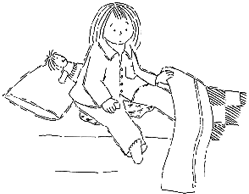Sleepwetting Forum
[sleepwetting a.k.a. nocturnal enuresis or bedwetting]
from Spontaneous Combustion
No child should have to wake up in a wet bed!

For children age six and up, sleepwetting is one of the most common and embarrassing disabilities, affecting about seven million school age children and teens in the US and Canada. Most try to keep it a secret from other children, even relatives, and many families let it go on for years with little support or appropriate treatment. Some children receive harmful responses, ranging from blaming and shaming to punishment and emotional and physical abuse. Learning, behavior, and health problems are possible side effects of untreated or badly treated sleepwetting.
In families who understand that most sleepwetting results from development and learning delays, school-age children and teens can help manage and compensate for these delays while they work on learning the missing skills and developing the delayed abilities.
This forum is part of a family-to-family support project helping people understand, manage, and resolve sleepwetting by school-age children and teens. For more information, contact farley@spont.com
Support on-line includes
EnuresisKids a moderated e-mail list for children with enuresis.
EnuresisParents an e-mail list for parents of children with enuresis.

Why say sleepwetting? Does that make a difference?
Yes. Sleepwetting is the preferred term here because it puts loss of bladder control when asleep into one word that is less negative or judgmental than the common term bedwetting, more quickly understood by most children than the medical term nocturnal enuresis, and clearer than both that it can happen when asleep anywhere, anytime, not just in bed at night. Changing how a famly talks about bladder control can make it easier to work on together. The word incontinence is commonly used for partial to complete loss of voluntary bladder control both awake and asleep. Most incontinence resources focus on the needs of adults with medical conditions or disabilities, but some include management for youth or address sleepwetting issues separately.
Why do some children sleepwet? Why do some sleep all night dry and others wake up instead of sleepwetting?
Children who sleepwet commonly have smaller than average bladder capacity for their age often combined with delayed development of a hormone cycle necessary for sleeping dry through the night, AND have not learned to awaken before sleepwetting. There are other factors that may make sleepwetting more likely or less likely to happen. [See Developmental Causes and Contributing Factors.] These factors include some medical, developmental, environmental, and behavioral issues which are not common but worth checking for because identifying and treating them can stop sleepwetting or make it more manageable.
So, if there are no medical issues to treat, how do kids and their families work on this together?
Responsible care and support starts with accepting that most causes of sleepwetting are developmental conditions, not things a child has much conscious control over. Next a family can work out how to manage the existing sleepwetting, often with external bladder controls such as incontinence pants, bedpads, medications, etc. [See Management Plans]
But isn't the child is still waking up wet?
The first goal is having children waking up each morning rested, relaxed, and confident in dealing with whatever is wet with no more adult attention needed than they would be getting if they had stopped sleepwetting. Once such a plan is in place, and children experience being responsible partners in managing sleepwetting with external controls, it can be easier for them to focus on using bladder exercises, mental exercises, biofeedback, or other appropriate techniques to develop the missing inner control.

Our Sleepwetting Forum Articles:
- Developmental Causes and Contributing Environmental Factors - basic background information
- Sleepwetting Management - a place to start
- Kidney Output and DDAVP - about the hormones controlling kidney function and hormone replacement therapy
- Stop and Go - a bladder muscle exercise
- Bladder Stretch - a bladder muscle exercise
- Imaging or Visualization Exercises - based on the book Dry All Night
- Wetness Alarms - how they work and may be useful
- Sleepwetting Resources - books, suppliers, and other information on-line.

Other Related Links:
Return to Spontaneous Combustion
 disclaimer
I am not a medical professional and do not offer advice that should be taken as medical or therapeutic in intent. Always consult a doctor for medical diagnoses and treatments. I have researched the area of teaching bladder control and managing bladder disabilities as part of volunteer work with incontinence support organizations and families of children with disabilities. I am a writer, actor, storyteller, children's bookseller, and parent of two young adults. I serve as list-owner for the Yahoo e-mail lists EnuresisKids and EnuresisParents.
disclaimer
I am not a medical professional and do not offer advice that should be taken as medical or therapeutic in intent. Always consult a doctor for medical diagnoses and treatments. I have researched the area of teaching bladder control and managing bladder disabilities as part of volunteer work with incontinence support organizations and families of children with disabilities. I am a writer, actor, storyteller, children's bookseller, and parent of two young adults. I serve as list-owner for the Yahoo e-mail lists EnuresisKids and EnuresisParents.
Tom

Page last updated on 9/26/2010 by Tom Farley of Spontaneous Combustion
 A SILVER RIBBON SITE
A SILVER RIBBON SITE 





